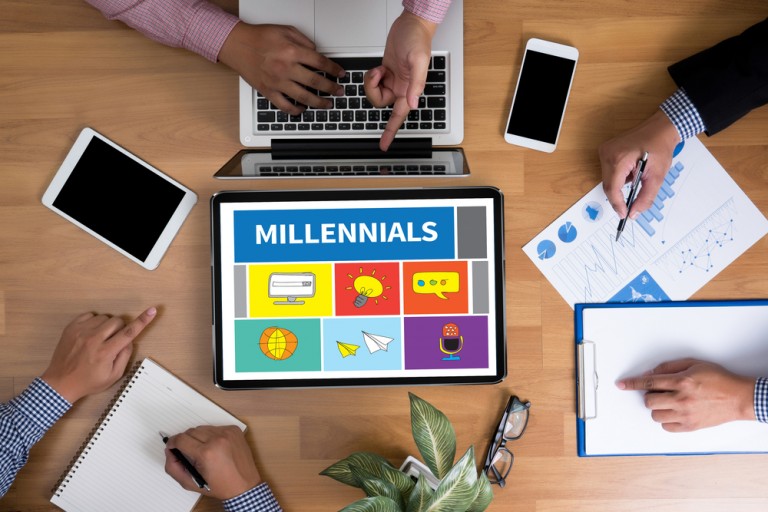The millennial generation—people born between 1980 and 2000—now make up a significant percentage of the population and workforce. In fact, these young people will soon constitute a majority of the workforce as Baby Boomers retire. While they have a great deal in common with earlier generations, there are some characteristics that set millennials apart from their elders. In order to harness their talents and work effectively with them, managers at every level must understand what makes them tick.
What Are the Defining Characteristics of Millennials?
Let’s start by talking about who millennials are. The demographics are easy and we have already discussed them—but who are they on a personal and psychological level? What are their defining characteristics, and what do those things tell us about how to manage them?
- Millennials tend to be trustful of organizations because they came of age in an era when, for example, the government was heavily involved in leveling the playing field in education and the workplace.
- Millennials have never known a time without computers, making them “digital natives.” They have a high level of comfort with technology.
- Perhaps because they have grown up with the internet, millennials are also extremely comfortable creating online content.
- Millennials tend to place a very high premium on work-life balance, and they are likely to gravitate to companies that do, too. Unlike some Baby Boomers and Generation Xers, they won’t prioritize work at the expense of their personal lives.
- Millennials are accustomed to receiving feedback on their performance, and they expect their employers to weigh in frequently so they have a barometer to measure the quality of their work.
- Finally, millennials want the companies they work for to make a difference and tend to be drawn to companies that either have a social purpose or that make an effort to align themselves with meaningful causes.
In short, people in the millennial generation can be hard working and creative with a high degree of technical ability, but they also have demonstrated a willingness to fight for balance in their lives and are unlikely to work themselves into the ground to keep a job.
How to Manage Millennials
Now that you understand who millennials are and how they think, let’s talk about some of the things you can do as a manager to maximize their abilities and lead them effectively and efficiently.

- If you want to attract millennials to your company, focus on creating a corporate culture that encourages fun, creativity, and collaboration. Millennials are willing to work hard for their employers, but they also believe that if they’re going to spend the bulk of their waking hours at work, there should be some benefit to doing so beyond a paycheck. One company that has created a millennial-friendly culture is the tech giant, Google. They have made their campus a fun and interesting place and offer many flexible benefits that help to attract Millennials.
- Speaking of flexibility, another way to keep millennials happy is to build flexibility into your benefits. For example, you might offer flexible work hours and telecommuting options to employees and provide extra time off in return for good work. Perks like these will allow millennials to achieve the work-life balance they crave.
- Provide regular constructive feedback. Not all feedback needs to be detailed, but it is a good idea to say a few words after you have reviewed a completed project or spoken to a client about their experience. Millennials don’t need to be coddled, and they aren’t narcissistic, but they do want and expect to hear from you regarding their performance—and not just when you’re giving a performance review.
- Embrace new technology and solicit millennials’ feedback about how to use it. Remember, millennials have an innate ease with technology that many older people lack. Employers need to take advantage of their experience and listen when they make suggestions about how to modernize and update services and processes.
- Find ways to demonstrate and encourage altruism and volunteerism. Whether you agree with their assessment or not, millennials tend to see their parents—Generation Xers—as fundamentally selfish. They want to find ways to give back to their communities and to the planet, and companies who make it possible for their employees to volunteer are more likely to retain millennials than those who don’t.
- Millennials can be very loyal, but they expect loyalty to be a two-way street. It isn’t enough simply to provide feedback on a regular basis. Even if it doesn’t come naturally to you, you must make a point of expressing appreciation for the work done by millennials. You don’t have to stand up and applaud when they enter the room, but it is important to make it clear that you do not take the work they do for granted. A little well-timed praise can go a long way when it comes to employee retention and loyalty.
In other words, the key to managing millennials is to embrace and acknowledge the things that make them different from preceding generations and find ways to integrate those things into your management style. If you can do that, you can make the most of your newest employees.
This is a Contributor Post. Opinions expressed here are opinions of the Contributor. Influencive does not endorse or review brands mentioned; does not and cannot investigate relationships with brands, products, and people mentioned and is up to the Contributor to disclose. Contributors, amongst other accounts and articles may be professional fee-based.

